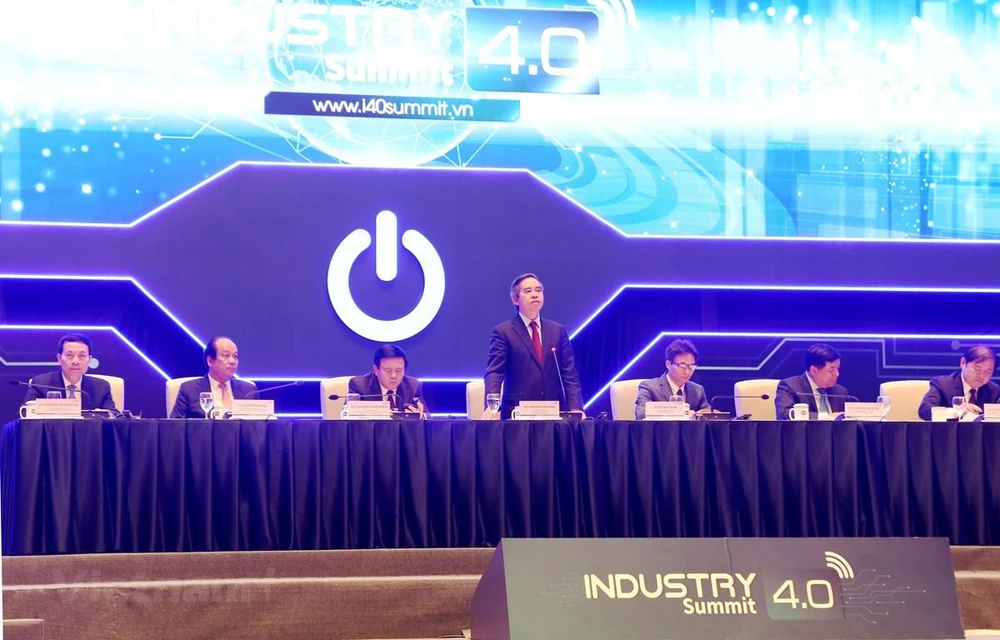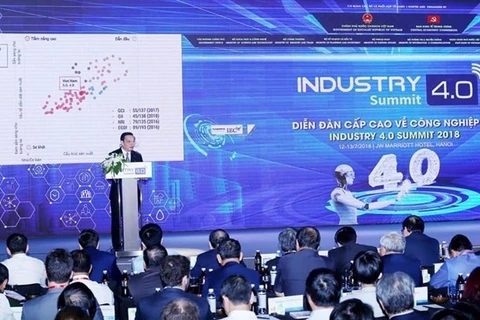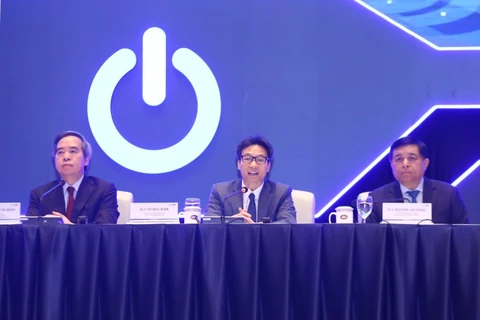
Hanoi (VNA) – Strong actions have been applied from central to grassroots level to speed up the application the Fourth Industrial Revolution (FIR) technologies, helping make changes in fields of production, business, cultural and social life, said Head of the Party Central Committee’s Economic Commission Nguyen Van Binh.
He made the statement at the Industry 4.0 Summit held in Hanoi on October 3.
The Politburo’s Resolution No.52-NQ/TW outlines a number of guidelines and policies to ensure the country’s active participation in the FIR, Binh said, adding under this resolution, the National Assembly, the Government, ministries and sectors and localities will engage in implementing concrete programmes and plans to accelerate the revolution nationwide.
A multitude of researches have shown that participation in the FIR will bring various positive results to Vietnam’s economic growth in the future. In a bid to turn it into reality, the Party and State directed all levels and sectors to promote the application of science, technology and innovation as well as boost research activities to actively join in the FIR.
In Vietnam, telecommunications infrastructure has been built in a synchronous manner, with mobile coverage reaching 99.7 percent of the population nationwide. 3G and 4G coverage reached over 98 percent with low cost, while the 5G network is undergoing testing and expected to be deployed commercially from 2020.
The digital economy has been formed and developed rapidly, becoming an increasingly important part of the economy and ranking 3rd in the ASEAN region in terms of scale. Digital technology has been applied in industries, agriculture and services, of which many new and cross-border businesses and service forms, based on digital technology and the internet, have created job opportunities, improved incomes and enhance the quality of people’s lives.
“The Party said that FIR will bring both challenges and opportunities. We must proactively prevent and limit the negative impacts of this revolution. It requires management innovation to reform institutions, piloting new models,” Binh said.
“For developing countries like us, this is a golden opportunity and an important tool to catch up, compete, and make breakthroughs in the future.”
Robust development of science and technology, particularly digital economy, has resulted in dynamic production across the country, he said, holding traditional mechanisms are no longer suitable, and they may hamper the FIR in Vietnam.
Therefore, it is necessary to have breakthrough policies to promote the revolution, he added.
“Deeply-rooted mindset will make us lag behind other countries in the FIR”.
Policy makers must be able to recognise the FIR development so as to well respond to the revolution.
“The Party requires new approaches to socio-economic management to embrace the FIR”, he stressed.
 Head of the Party Central Committee’s Economic Commission Nguyen Van Binh addresses at the Industry 4.0 Summit (Photo: VietnamPlus)
Head of the Party Central Committee’s Economic Commission Nguyen Van Binh addresses at the Industry 4.0 Summit (Photo: VietnamPlus)
By 2025, Vietnam strives to maintain its position in the top three ASEAN countries in the Global Innovation Index (GII) rankings, building the digital economy to account for about 20 percent of GDP while labour productivity increases on average over 7 percent per year.
By 2030, the country will be among the top 40 countries in the world in the GII rankings, with the digital economy accounting for over 30 percent of GDP and labour productivity increasing on average about 7.5 percent.
To achieve these objectives, Resolution No.52 states several guidelines and major policies needed to be implemented, including innovating thinking and perfecting institutions to facilitate proactive participation in the FIR and the process of national digital transformation.
It also points out specific policies on the development of essential infrastructure, enhancement of the national creation and innovation capacities, human resources' quality and international integration.
“Vietnam wishes to expand and deepen scientific and technological cooperation with partners, especially strategic partners with advanced science and technology qualifications, who are leading in FIR," Binh said./.























